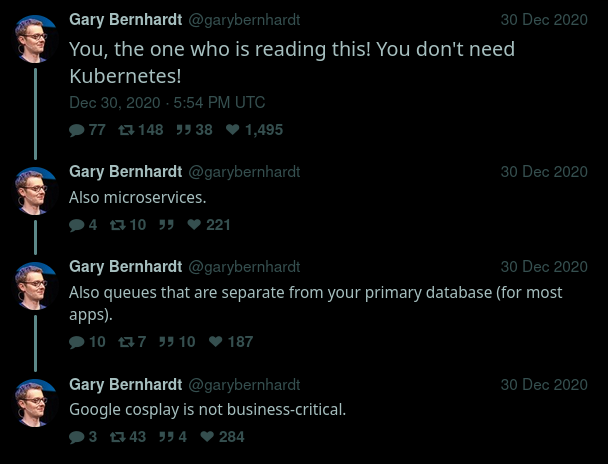this post was submitted on 21 Mar 2024
356 points (96.4% liked)
Programmer Humor
19623 readers
1 users here now
Welcome to Programmer Humor!
This is a place where you can post jokes, memes, humor, etc. related to programming!
For sharing awful code theres also Programming Horror.
Rules
- Keep content in english
- No advertisements
- Posts must be related to programming or programmer topics
founded 1 year ago
MODERATORS
you are viewing a single comment's thread
view the rest of the comments
view the rest of the comments

Absolutes in programming tend to lead to bad designs. This is more a “I’m gonna stir up some shit on Twitter” post than real wisdom.
The same shit happened last summer when AWS came out with their “we dropped microservices for a monolith and look at our speed increase” article which ignored good design principles. Sometimes you should split things over business domains so you can deploy and code independently. Sometimes Kubernetes is the best way to handle your scale needs. The stories we normally read are about people doing it wrong (eg AWS making a bunch of microservices inside a domain sending fucking gigs of data between what should have been functions in a single service). Inexperienced folks don’t always know when to move from their minimum viable solution to something that can scale. That doesn’t mean you remove these things, it means you train on when you need them.
Should we abandon design patterns because singletons or flywheels aren’t the correct solution all of the time?
Hush, I'm working as an SRE and don't want anyone to figure this out.
Add Istio and no one will be able to fire you without fucking up mutual TLS
Even if what you say isn't true I'm giving my vote of confidence so I can just shrug whenever someone disagrees with my architecture.
Don't like that I chose a single API server? We're avoiding sprawling microservice deployments with tightly coupled dependencies.
Don't like all the docker containers? We're avoiding bloated, tightly coupled logic that ignores business domains.
Monoliths are the answer to bad microservices. Microservices are the answer to bad monoliths. It’s all cyclic and four different architects are going to have fifteen different opinions on how your system should be built. Do the thing that makes sense for your team and try to stay flexible.
Precisely, Gary Bernhardt has given a talk on ideology. I don't think he's precisely someone who thinks in absolutes. It's just preaching that some stuff is (probably) used more than it should. I've seen way, way, way worse projects that over engineered things and made things slow and unmanageable, than the opposite. Of course, everyone has seen different things, and our perceptions are amplified and biased by that.
Saying that some projects, at some point in their lifecycle, don't need certain things, is not saying that those things have no place. Also, if one can't design a monolith that isn't bloated and tightly coupled, one definitely has no business designing microservices. Using microservices is neither necessary, nor sufficient to achieve decoupling.
Monolithic services are the ideal way to begin a project, as using basic good practices, we can build a service that does many things with minimal coordination, and as it grows and requirements change or are discovered, we can easily refactor to keep things simple. As the software matures, we find the natural service boundaries, and find that certain pieces would perform better if they were separated out and could scale independently, or act asynchronously. Since we have followed good practices, this should usually be a simple matter of removing a class or module to a new service, and replacing it with a facade, such that the rest of the monolith doesn't have to change at all.